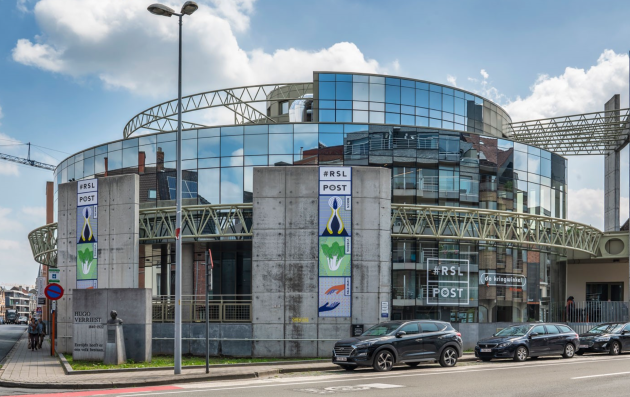Date of label : 29/10/2024
-
Roeselare , Belgium
-
Size of city : 65.000 inhabitants

Modern, circular building.
Summary
The community innovation hub, RSL op Post, in Roeselare (BE) creates a space that empowers (vulnerable) civilians to use their talents for self-sustainability. It shifts social care from traditional support to community-driven help. The hub provides essential services like a night shelter and social grocery, while also offering programmes in work, leisure, welfare, education, and a makerspace. Diverse stakeholder organisations formed an open community, promoting innovation, digital skills, social networking, and self-sufficiency. The hub's core principles are 'meeting' and 'making', fostering connections, ideas, healthy food habits and sustainable urban living. RSL op Post is a vibrant community hub, inspiring collaboration and creativity beyond its walls.
The solutions offered by the Good Practice
The community hub RSL op Post in Roeselare reimagines social services, by empowering people to use their own talents and networks for self-reliance. It combines essential services with activities designed to build skills and promote sustainability.
Digipunt provides digital assistance, Leerwinkel offers educational advice, Praatwijzer facilitates language learning, CoderDojo introduces children to computer coding, Techniekclub encourages STEM learning, and cooking workshops provide the homeless with practical skills. These programmes collectively foster social inclusion and self-reliance.
Major achievements include cooperation with five core organisations, collaborations with 35 partners, and hosting over 700 activities annually, reaching 120 visitors daily. With ongoing support from the city and partners to continually adapt to community needs (e.g. cycling routes and food accessibility).
Building on the sustainable and integrated urban approach
The community innovation hub tackles social, economic, and environmental challenges through reimagined, collaborative and community-driven social services. By tapping into local skills and networks, it can offer an integrated suite of services, including a night shelter, a social grocery, a set of educational, digital and creative activities, shared kitchens, and artists’ workshops.
This comprehensive approach meets vulnerable people’s needs, fosters self-reliance, promotes sustainability, and creates an inclusive community.
For example, the social grocery rescues local vegetables that would otherwise become waste, with volunteers preserving them with the support of a local NGO (Velt vzw) using Flemish, Japanese and African pickling techniques. 'De Inmakers' (The Picklers) creates a sustainable solution to reduce food waste, provides community education, and social support through the participation of vulnerable individuals as volunteers.
Based on participatory approach
The project brings together social organisations, local authorities, volunteer organisations, social/local businesses, and community members. Collaboration is key, with five core organisations and informal partnerships with over 35 groups.
A crucial element for success is the governance model for collaboration, based on a horizontal hierarchy, strong communication, and synergies between partners. Cohesion and community ownership is enhanced through campaigns, clear signage, community-driven projects such as murals, and regular community events.
This participatory approach ensures diverse perspectives are heard, fostering innovation and community ownership. The rental model for spaces in the hub is based on each organisation’s societal and sustainable value, showcasing an innovative approach to cooperation.
What difference has it made?
The community innvoation hub RSL op Post benefits the local community in Roeselare by improving access to essential services, fostering social connections, and promoting self-sustainability. Reaching 120 visitors daily, with over 700 activities conducted annually, the hub has strengthened cooperation across sectors and enhanced the social fabric:
- The social grocery averaged 80 families visiting per day, and the eco-café had 150 visitors daily.
- Digipunt, supported by seven volunteers, had an average of 26 visitors per session, and held four in-depth one-on-one sessions.
- The rental rooms were reserved 1 107 times per year by community groups, businesses and NGOs for workshops, sessions, meetings, etc.
- The Repair Café organised by one of the volunteer groups coordinates a network of 56 volunteer repairers who successfully carried out 170 repairs on items that would otherwise have gone to waste. This saved over 640 kg of electronic waste, preventing over 4 500 kg of CO2 emissions.
- The night shelter with 18 spaces addresses a critical local need.
Why this Good Practice should be transferred to other cities
The community innovation hub RSL op Post offers an innovative approach to urban development that blends social services with creative spaces, and promotes social inclusion, digital inclusivity, equity, and sustainability at the community level.
It supports key policy frameworks:
- Multiple Sustainable Development Goals (SDGs).
- The Urban Agenda for the EU, the European Green Deal, and the New European Bauhaus initiative, by linking sustainability with community resilience.
- The European Pillar of Social Rights, by ensuring equal access to essential services, and Cohesion Policy by enhancing social and economic integration.
The innovative community hub approach is adaptable to other cities with similar supportive governance frameworks. Several elements of the practice can be adopted individually, although the real power is in the integrated services approach. It can be tailored by adapting services and activities to meet specific local needs.
Transfering the RSL op Post model requires commitment from local authorities and community organisations to implement a more integrated approach to social services, linking inclusion, digital access and sustainablity issues. Understanding local context and community needs will be essential for successfully adapting the approach.
Cities seeking a similar hub will need local partnerships and funding. RSL op Post’s replicable principles and structure have been recognised by the Interreg Europe project InterRevita as a good practice for neighbourhood revitalisation.
